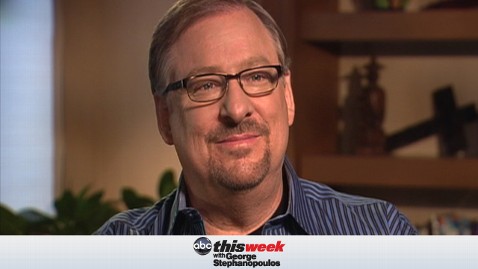Rick Warren: 'Coarsening of our Culture' Concerns Me

(ABC News)
For "This Week," I sat down with Pastor Rick Warren of Saddleback Church in Lake Forest, Calif. As many Americans celebrate Easter and Passover, I asked Warren about the state of nation spiritually. The full and exclusive interview will air tomorrow morning on "This Week."
TAPPER: When you gave the invocation at President Obama's inauguration and you said the following: 'And as we face these difficult days ahead, may we have a new birth of clarity in our aims, responsibility in our actions, humility in our approaches and civility in our attitudes, even when we differ.'
TAPPER: How are we doing? What's the state of the nation spiritually?
WARREN: The coarsening of our culture and the loss of civility in our civilization is one of the things that concerns me most about our nation. We don't know how to disagree without being disagreeable. The fact is, you can - you can walk hand-in-hand without seeing eye-to-eye. And what we need in our country is unity, not uniformity.
There are major differences, politically, religiously, economically in our nation. We have many different streams in our nation. We're not all going to believe the same, and any politician who acts like we do is really - that's a nice campaign statement. We have major differences. I don't think some of those differences are solvable.
What is solvable is how we treat each other with our differences. As a Christian, I am commanded by Jesus Christ to love everybody. I am not allowed to hate anyone. Other people are allowed to hate me. But as a Christian, I am not allowed to hate anyone. In fact, the Bible tells me in I Peter, show respect to everyone, even people I totally disagree with.
So I'm coming from that viewpoint in that we must return civility to our civilization in order to get on. But the reason I do that is because of the deeper reason, there's a spiritual root to my reason for civility. If you don't have a spiritual root for that reason, then you're going to be - go for the expedient, and that is, 'We need to win. We need to win in this issue. We need to win in this election. We need to win in this.'
And it becomes - you can't fix the problem as long as you're fixing the blame. And the thing that I dislike the most about our current American discourse is people are constantly blaming everybody else. I tell my members, you spell blame B-LAME. And any time a leader blames somebody else, he or she is being lame. And we need to get - we can't fix the problem until we stop fixing the blame.